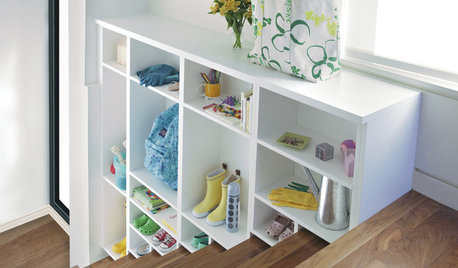Upside down and want out!
ohcherryoh
12 years ago
Related Stories

REMODELING GUIDESLive the High Life With Upside-Down Floor Plans
A couple of Minnesota homes highlight the benefits of reverse floor plans
Full Story
LIFEYou Said It: ‘Slow Down and Recharge’ and More Houzz Quotables
Small spaces stood out during a week of stories celebrating different lifestyles at home
Full Story
GARDENING FOR BIRDSBackyard Birds: Those Nutty Nuthatches
The North American songbirds, which often perch upside down, make themselves known in the winter landscape
Full Story
FURNITUREOn Trend: 7 Wood Designs Turned Inside Out
Heading right for the source, these inventive furnishings have raw appeal for rooms
Full Story
HOUZZ TOURSMy Houzz: Stripping Down Uncovers a 1910 Bungalow's Beauty
A first-time homeowner brings out the charm and coziness in her Utah home through determination and patience
Full Story
DECORATING GUIDESNeed Peace and Quiet? Muted Colors Tone Things Down
Subtle hues can be perfect for large rooms and to balance out bolder colors in a home
Full Story
GARDENING AND LANDSCAPINGBudget Decorator: 10 Ways to Deck Out Your Patio
Hang a vintage sign here and some inexpensive curtains there, for a patio or deck that looks polished and pulled together
Full Story
STORAGE10 Ways to Get More Storage Out of Your Space
Just when you think you can’t possibly fit all your stuff, these storage ideas come to the rescue
Full Story
KITCHEN DESIGNTrick Out Your Kitchen Backsplash for Storage and More
Free up countertop space and keep often-used items handy by making your backsplash more resourceful
Full Story
STORAGEHat Storage: Don’t Get Bent Out of Shape
From boxes to hooks, we look at ways to keep your lid on straight in time for summer hat season
Full Story




aidan_m
stinky-gardener
Related Discussions
Growing tomatoes upside down ?
Q
Why did my pineapple upside down cake do THAT? (pic)
Q
RECIPE: Cranberry Upside-Down Coffee Cake
Q
Upside down; Will this solution work?
Q
aidan_m
writersblock (9b/10a)
cas66ragtop
LoveInTheHouse
liriodendron
ncrealestateguy
stinky-gardener
OttawaGardener
liriodendron
berniek
stinky-gardener
LoveInTheHouse
stinky-gardener
writersblock (9b/10a)
sas95
stinky-gardener
sas95
stinky-gardener
writersblock (9b/10a)
writersblock (9b/10a)
stinky-gardener
writersblock (9b/10a)
sas95
stinky-gardener
liriodendron
c9pilot
stinky-gardener
writersblock (9b/10a)
berniek
c9pilot
writersblock (9b/10a)
logic
OttawaGardener
writersblock (9b/10a)
LoveInTheHouse
logic
jmc01
writersblock (9b/10a)
logic
logic
chispa
logic
LoveInTheHouse
ncrealestateguy
azmom
brickeyee
writersblock (9b/10a)
chispa